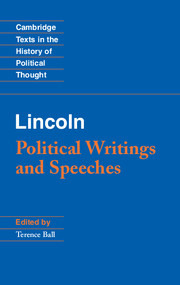Book contents
- Frontmatter
- Contents
- Preface
- Introduction
- Chronology
- Biographical synopses
- A note on sources and abbreviations
- Bibliographical note
- I Political Writings and Speeches
- II Notes and Fragments
- 36 On Government (1854?)
- 37 On Slavery (1854?)
- 38 On Slavery and Democracy (1858?)
- 39 On Pro-slavery Theology (1858)
- 40 On the Struggle against Slavery (c. July 1858)
- 41 On Racial (In)equality 1
- 42 On Racial (In)equality 2
- 43 The Declaration of Independence includes all men
- 44 On Slavery, Property, and the Constitution
- 45 On Labor and Capital 1 (c. 1846–7)
- 46 On Labor and Capital 2
- 47 On Labor and Capital 3
- 48 On Liberty
- 49 On the Thirteenth Amendment (abolition of slavery)
- Index
39 - On Pro-slavery Theology (1858)
Published online by Cambridge University Press: 05 April 2013
- Frontmatter
- Contents
- Preface
- Introduction
- Chronology
- Biographical synopses
- A note on sources and abbreviations
- Bibliographical note
- I Political Writings and Speeches
- II Notes and Fragments
- 36 On Government (1854?)
- 37 On Slavery (1854?)
- 38 On Slavery and Democracy (1858?)
- 39 On Pro-slavery Theology (1858)
- 40 On the Struggle against Slavery (c. July 1858)
- 41 On Racial (In)equality 1
- 42 On Racial (In)equality 2
- 43 The Declaration of Independence includes all men
- 44 On Slavery, Property, and the Constitution
- 45 On Labor and Capital 1 (c. 1846–7)
- 46 On Labor and Capital 2
- 47 On Labor and Capital 3
- 48 On Liberty
- 49 On the Thirteenth Amendment (abolition of slavery)
- Index
Summary
Suppose it is true, that the negro is inferior to the white, in the gifts of nature; is it not the exact reverse justice that the white should, for that reason, take from the negro, any part of the little which has been given him? “Give to him that is needy” is the Christian rule of charity; but “Take from him that is needy” is the rule of slavery.
Pro-slavery theology
The sum of pro-slavery theology seems to be this: “Slavery is not universally right, nor yet universally wrong; it is better for some people to be slaves; and, in such cases, it is the Will of God that they be such.”
Certainly there is no contending against the Will of God; but still there is some difficulty in ascertaining, and applying it, to particular cases. For instance we will suppose the Reverend Dr. Ross has a slave named Sambo, and the question is “Is it the Will of God that Sambo shall remain a slave, or be set free?” The Almighty gives no audible answer to the question, and his revelation – the Bible – gives none – or, at most, none but such as admits of a squabble, as to its meaning. No one thinks of asking Sambo’s opinion on it. So, at last, it comes to this, that Dr. Ross is to decide the question. And while he considers it, he sits in the shade, with gloves on his hands, and subsists on the bread that Sambo is earning in the burning sun. If he decides that God wills Sambo to continue a slave, he thereby retains his own comfortable position; but if he decides that God wills Sambo to be free, he thereby has to walk out of the shade, throw off his gloves, and delve for his own bread. Will Dr. Ross be actuated by that perfect impartiality, which has ever been considered most favorable to correct decisions?
- Type
- Chapter
- Information
- LincolnPolitical Writings and Speeches, pp. 225 - 226Publisher: Cambridge University PressPrint publication year: 2012

